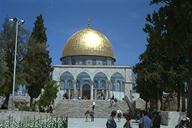
The issue of excavating on the Temple Mount is an extremely sensitive one. For one, there would be intrusive digging into two holy places: the Al-Aqsa mosque and Dome of the Rock, as well as the Temple remains. At the same time, as Dr. Gabi Barkai of Bar Ilan University noted, it is the most important archaeological site in all of Israel. That holds true for Muslims, Jews, Christians, and every ethno-religious group that has a presence in the Israel area. Yet Barkai is polarizing a debate on an already sensitive issue that should be handled with care. There are faults on both sides that need to be corrected so both Muslims and Jews can reclaim their ancestral heritages. To begin with, we all need to calm down. If we want to figure out what exactly happened thousands of years ago to create the great country that is now Israel, then we’re going to need archaeology. While I agree that the Temple Mount is a sacred site and should be regarded as such, that doesn’t mean that no digs should take place, just that they should be done delicately. We need to emphasize concern both for the sacred spaces themselves and for all religious groups.
At the moment, it seems that Muslim authorities on the Temple Mount will not permit Israeli archaeologists to dig. Barkai says that Muslim authorities have conducted illegal digs on the Temple Mount by themselves. What about a coalition of Jewish and Muslim archaeologists? Undoubtedly, there would be scholars from both sides who would welcome a chance to investigate this fascinating site. If we could bring together a team of equal parts Jewish scholars and Muslim scholars, maybe the idea of only Jewish archaeologists wouldn’t intimidate Muslim authorities as much.
Part of the issue is the way that the Wakf Islamic Trust, who heads the Muslim sacred places on the Temple Mount, has handled archaeology in the past. Several years ago, when it requested government permission and received it to construct emergency exits for its mosques, the Wakf shoveled out tons of dirt from the Mount and dumped it elsewhere. Valuable archaeological sediments that could have told us much about earlier Temple periods were handled recklessly and foolishly. Barkai has received permission to look through the dirt piles to find artifacts and the Knesset has eagerly participated in his efforts.
While Barkai might be angry that archaeological digs have been poorly conducted in the past, that does not mean that all hope is lost for the future. If scholars from all religious groups with a stake in Jerusalem’s history band together, then we can all share its rich cultural legacy.
